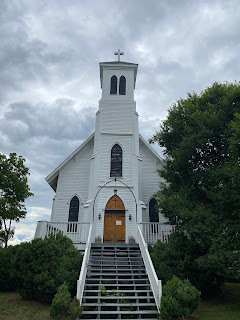When I first applied for
the FEWS Summer Team Impact Project, I never would have guessed that I would be
doing my work remotely and meeting with my peers and project leaders over
WebEx. The FEWS Summer Team Impact Project examines the interconnectedness of
food, energy, and water systems (FEWS) in rural Rapidan, located in Culpeper
County, VA and finding solutions to FEWS problems in the area. The location for
this project was chosen for many reasons, one of which being that Rapidan is
relatively close to Fairfax. This made it possible for the team members to be
able to go to the project location and see the farms, observe the flooding of
the Rapidan River, and speak directly with the community members. Of course,
this did not happen due to COVID-19. However, the FEWS team did not let this alter
the main goals of the project.
The FEWS Project shifted
gears. Now, instead of in-person interviews, we have been meeting with dozens
of farmers, community leaders, and community members online. On a positive
note, it has allowed us to interview many more people than expected, because
working remotely has increased the flexibility of many people’s schedules. Our
enthusiasm for this project has certainly not been stifled by COVID-19, as we
have been able to meet virtually with so many locals of Rapidan and Culpeper
County and deepen our understanding of the various issues they have been
facing. Flooding is a prominent issue for many community members. Obesity and adverse
health effects of malnutrition are two more prominent issues. I could go on and
on about the multifaceted issues that community members of Rapidan have faced,
but our project is still ongoing and every day we learn more about the
negatives and positives of being a resident of Rapidan. Our hopes for this
project remain the same during COVID-19: that we can find solutions for Rapidan
residents and work to solve the issues relating to food, energy, and water
systems in their town.




